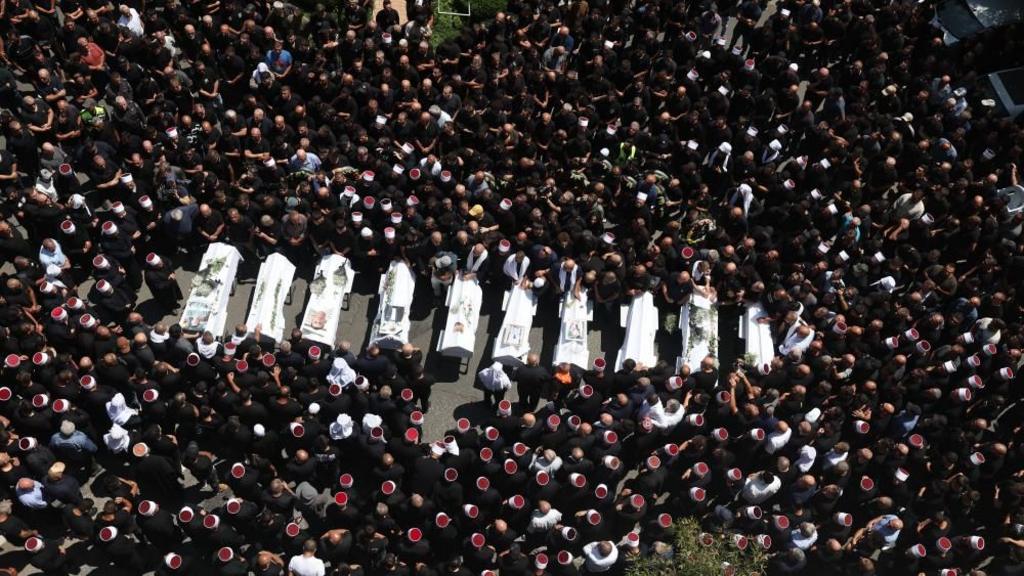US Urges Caution Amidst Rising Tensions: Israel’s Response to Hezbollah Rocket Attack

The recent escalation in the Israel-Hamas conflict has now drawn in Hezbollah, adding a new layer of complexity to an already volatile situation. After a deadly rocket attack from Lebanon over the weekend, which tragically killed 12 youths in the Israeli-controlled Golan Heights, the situation is heating up. This incident has not only heightened tensions between Israel and Hezbollah but has also prompted cautionary statements from the United States.
Rocket Attack on Israel: What Happened?

On the weekend, a rocket attack from Lebanon targeted the Golan Heights, an area under Israeli control. The attack, which resulted in the deaths of 12 young individuals, has significantly escalated the conflict between Israel and Hezbollah.
Key Details of the Attack
- Date of Attack: Over the weekend
- Location: Israeli-controlled Golan Heights
- Casualties: 12 youths killed
This tragic event has sparked fears of a wider regional conflict, as cross-border tensions between Israel and Hezbollah have been escalating almost daily since the onset of the war with Hamas in Gaza.
Hezbollah’s Stance and Israel’s Response
In the aftermath of the rocket attack, Hezbollah made a rare public statement, denying any involvement in the incident. Despite this denial, the situation remains tense, with ongoing cross-border skirmishes and military actions.
Recent Developments
- Israeli Strikes: In response to the rocket attack, Israeli forces conducted strikes in southern Lebanon, targeting Hezbollah operatives and infrastructure. These strikes resulted in the deaths of two individuals on a motorcycle and injuries to three others.
- Hezbollah’s Actions: Reports indicate that Hezbollah has begun moving precision-guided missiles. However, there are signs that the group does not seek a full-scale war with Israel at this time. Analysts suggest that engaging in a northern conflict while Israel is already focused on Gaza would strain Hezbollah’s resources.
US Intervention and Cautions
Amid the rising tensions, the United States has issued a cautionary note to Israel. The US is concerned that an escalation with Hezbollah could further destabilise the region and complicate ongoing efforts to manage the broader conflict with Hamas.
US Concerns
- Regional Stability: The US is wary of actions that might trigger a wider conflict, which could have destabilising effects across the region.
- Focus on Gaza: With Israel already heavily engaged in Gaza, additional conflict in the north could stretch its military capabilities thin.
Israeli Prime Minister’s Reaction
Israeli Prime Minister Benjamin Netanyahu visited the site of the rocket attack on Monday. He vowed a “severe” response, stating that “our response will come.” Despite his strong rhetoric, some local residents have expressed discontent, with protests emerging in the Druze village where the attack occurred.
Local Reaction
- Protests: Residents of the Druze village protested against the use of the tragedy for political gain, demonstrating a complex reaction to the escalating violence.
Hezbollah’s Capabilities and Intentions
Hezbollah’s military capabilities are a significant factor in this conflict. Unlike Hamas, Hezbollah is believed to possess advanced weaponry, including precision-guided missiles. The group’s reluctance to escalate the situation further suggests a strategic calculation to avoid a full-scale war with Israel.
Hezbollah’s Military Strength
- Superior Firepower: Hezbollah’s arsenal includes more advanced weaponry compared to Hamas.
- Strategic Calculations: The group is aware that engaging in a northern conflict could overextend its resources and complicate its strategic objectives.
The Broader Implications
The recent escalation between Israel and Hezbollah has broader implications for the Middle East. It underscores the delicate balance of power in the region and highlights the potential for a more widespread conflict if tensions are not carefully managed.
Potential Regional Impact
- Increased Instability: Further escalation could lead to increased instability in the region.
- Impact on Peace Efforts: The conflict might hinder ongoing peace efforts and diplomatic initiatives aimed at resolving the broader Israeli-Palestinian conflict.
Conclusion
The rocket attack on the Golan Heights and the subsequent response from Israel and Hezbollah mark a significant escalation in an already tense situation. With the US urging caution and the potential for broader regional impacts, the situation remains fluid. As Israel weighs its next steps, the international community will be closely watching developments to gauge the potential for further escalation or de-escalation.
For more updates on the Israel-Hezbollah conflict and related regional developments, stay tuned to Al Jazeera and BBC News.



